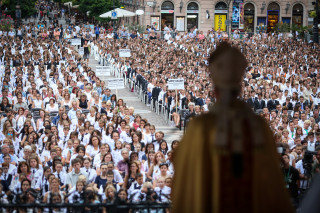
After World War II, in the 1946/47 school year, 1% of kindergartens, 41% of primary schools, 24% of civil schools, 28% of secondary schools, 17% of vocational institutes, and 56% of primary school and kindergarten teacher training institutions were maintained by the Catholic Church. Although the communist dictatorship intended to use nationalization to entirely eradicate the denominational education system in 1948, after the agreement reached in 1950 a total of eight secondary schools were permitted to continue operations under the maintenance of four monastic orders, namely the Benedictine Order, the Franciscan Order, the Piarist Order and the School Sisters of Notre Dame. These institutions managed to provide a safe harbor for the values of Catholic education during the years of dictatorship.
Starting in the 1990s, new laws that enabled the Catholic Church to resume its more important role in public education were passed after the change in political system. This was followed by rebuilding the system of Catholic kindergartens and schools, which continues to this day. Today, at around 9%, the number of institutions run by the Catholic Church remains significantly lower among the total number of Hungarian education institutions.
After the change in political system, the palette of institutions greatly increased in variety, seeing a launch of kindergartens, primary schools, primary art institutions, and various vocational training schools. Secondary schools offer 4, 5, 6, or 8 year programs and often provide evening and correspondence classes in addition to teaching regular full-time students. A number of kindergartens and schools offer possibilities for nationality or bilingual education. Primary art schools most frequently teach music, with creative and industrial arts, dance, theatre, and puppetry also quite common.
In the 2022/2023 school year, 14,430 teachers taught a total of 144,562 children in the spirit of Catholicism at 771 locations operated by 355 institutions.
The institutions are maintained by 15 dioceses, 26 monastic orders, and the Kolping Education and Social Institution Maintenance Organization, Gál Ferenc University, and the Károly Eszterházy Catholic University.
In June 1997, the Hungarian Catholic Bishops’ Conference (MKPK) established the Catholic Pedagogical Institution to provide professional support to Catholic institutions. In addition to supporting operators and heads of institutions, the Institution organizes trainings, workshops, and thematic professional conferences and operates a network of consultants. It also implements a variety of projects that reaches out to the entire institutional network, and is currently engaged in a program for child protection and the protection of the created environment.